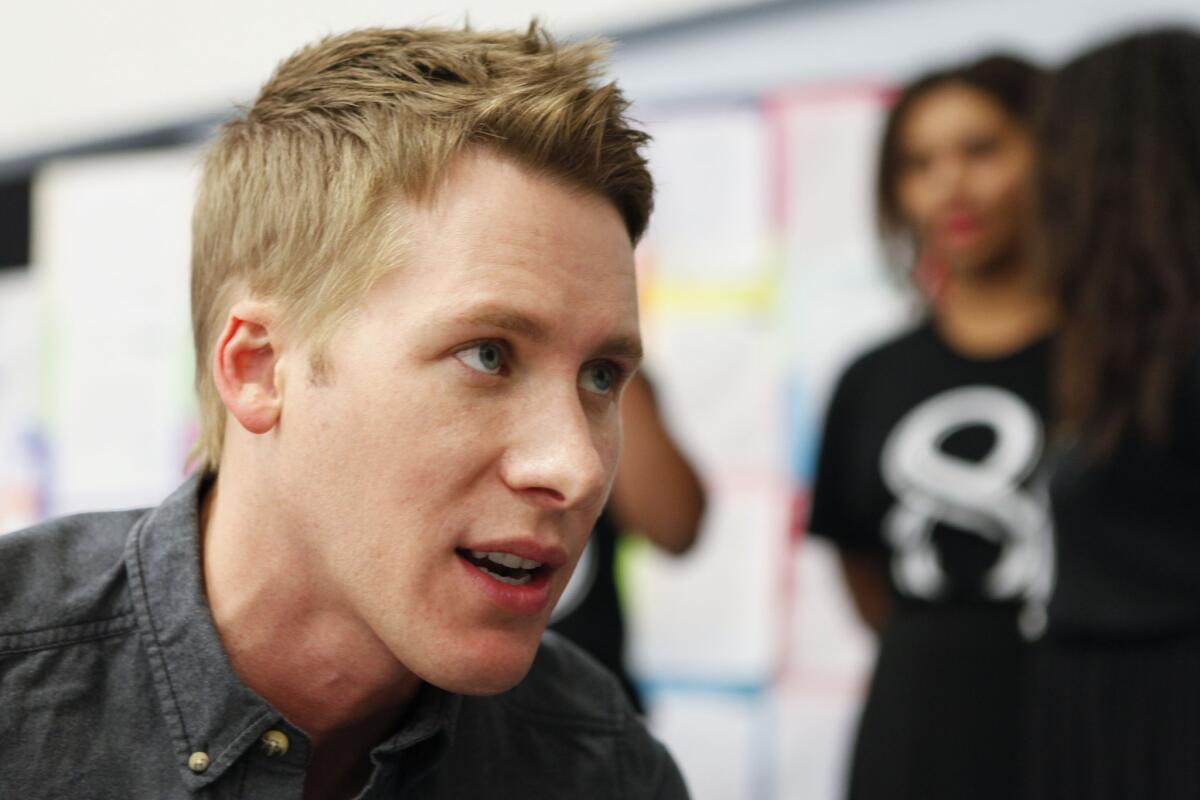Questions plague Pasadena college over Dustin Lance Black debacle

Is there something more to be said about the snafu at Pasadena City College that resulted in the snubbing of an Oscar-winning screenwriter who was invited to be the school’s commencement speaker then crudely disinvited?
Absolutely.
The school has tried to explain it all away as an unfortunate misunderstanding and has apologized, sort of, to Dustin Lance Black, class of ’92. Black, who wrote “Milk,” was told his services would not be needed at the school’s May 9 graduation after administrators discovered he was involved in a five-year-old sex tape “scandal” that might give the school a “bad name.”
They even seemed to realize that Black, an LGBT activist, was the victim in that case. The notion that Black’s misfortune could reflect poorly on his alma mater is such a stretch that it has inspired accusations of homophobia, which the school of course denies.
Still, important questions linger about how administrators handled this ridiculous episode, whether they should be more forthcoming in their account of how things went so terribly awry, and why they have clammed up.
On Monday, in an effort to bring an end to the controversy, PCC spokeswoman Valerie Wardlaw attempted a tortured explanation on behalf of the Pasadena Area Community College District Board of Trustees about how the debacle went down. She also announced that the official commencement speaker would be Pasadena Public Health Director Eric Walsh.
Sadly, there was no way to make this self-inflicted injury seem like an innocent mistake. Rescinding Black’s invitation was a fumbled attempt at controlling nonexistent damage that has now escalated into a situation requiring damage control for actual damage.
School officials pretended that Black was never approved as commencement speaker, when in fact they approved him. They said that his brush with a sex scandal has “no place in public discussion,” when in fact they discussed it with reporters, students and each other.
“At no time,” the statement insisted, “did a recommendation to invite Mr. Black ever reach the college president or the Board, nor were the college president and the Board aware that this invitation had been sent to Mr. Black’s assistant.”
Yet it’s very clear that the college president and the board of trustees unanimously approved a list of eight potential speakers a month and a half ago that included Black. What did they think would happen after they approved the list? That no one would be invited?
The others on the list were Father Greg Boyle, women’s rights activist and aspiring Democratic California state Sen. Sandra Fluke, the polytalented actor James Franco, motivational speaker Ramsey Jay Jr., basketball great Magic Johnson, California Supreme Court Justice Joyce Kennard and the acclaimed novelist and poet Luis Rodriguez.
Black, it turned out, was not just the first to respond, but the only one to accept.
Where else did the statement go astray?
It said that an invitation to a commencement speaker can only be extended by the college president. But the governing school policy, which was helpfully attached to the statement, says that invitations can be extended by the president, a superintendent or a “designee.”
Student trustee Simon Fraser was acting as just such a designee when he was asked by a school administrator to invite Black because the pair had once met at a conference and Fraser had an email address for Black’s assistant.
On March 11, Fraser emailed Black’s assistant: “We would like to formally invite Mr. Black to conduct the commencement address to the students as we celebrate our theme of ‘Proud Past, Global Future.’”
“What an honor!” the assistant replied within minutes.
(Emails were provided to me, and have also appeared in the Courier.)
Two and a half weeks later, on April 2, Pasadena City College Supt. and President Mark W. Rocha told the board of trustees that none of the invited speakers was available. Well, he sort of told them that. “None of the speakers on the list were able to confirm for Commencement and the one who could is a controversial figure,” wrote Rocha, who has a doctorate in English and teaches composition. Included in his note to trustees was an addendum from Assistant Supt. Robert Bell, elaborating on the “controversial figure.”
“Recently,” Bell wrote, “a 2009 sex tape was leaked without consent, showing Mr. Black engaging in unprotected sex. The incident has caused him to suffer embarrassment. We became aware of this after the initial offer was extended to Mr. Black.”
Bell felt that because the college had a sex scandal involving a heterosexual professor who taught pornography and slept with students, having Black as speaker “may not be in the best interest of the District.”
(By PCC’s twisted logic, Sen. Fluke, who was involved in a “slut” scandal, would not be suitable to speak. Nor would Franco, who was recently involved in an “underage girl” scandal. And don’t they realize that Father Boyle hangs out with known gang members?)
“This is latent homophobia,” Fraser told me Thursday. “I say ‘latent’ because overtly, the board members aren’t homophobic.” Fraser takes particular issue with Bell’s concern about “unprotected sex.”
“’Unprotected sex’ is not an issue when it’s a heterosexual woman having a baby. We don’t say, ‘We hope the father doesn’t have AIDS.’ To claim that Mr. Black was promoting unsafe sex to people is completely wrong.”
On April 14, four weeks after Black enthusiastically accepted the speaking invitation, he was sent one of the most mealy mouthed emails I’ve ever read:
“I wish to inform you that Mr. Black will not need to rearrange his busy schedule to appear as commencement speaker,” wrote Assistant Supt. Bell. “I understand that Mr. Black’s time is valuable and important and, again, I apologize for the delay in finalizing this with you and him.”
On April 2, at its regular meeting, the college board was abruptly informed that graduating students would be addressed by Walsh, who is, Rocha promised, a “dazzling” speaker.
“The important point here is how the Board acted as a whole, finally, and in public,” the college said in the statement that raised more questions than it answered. “The Board’s position to invite Dr. Walsh was voted on by the Board and stands as its final decision.”
That came as a surprise to two board members, with whom I have spoken on condition of anonymity. They said no such vote ever took place.
When I asked President Rocha, Board of Trustees President Anthony Fellow and spokeswoman Wardlaw about that, and other discrepancies, they refused to talk.
“The PACCD Trustees and the administration have issued its public statement on this matter,” Wardlaw told me, “and will stay within this statement without further comment.”
I am not sure what it means to “stay within” a statement.
But it must be getting kind of stuffy in there, what with all the hot air.
[For the record, 9:46 a.m., April 26: An earlier version of this post incorrectly identified Board of Trustees President Anthony Fellow as Arthur Fellow.]
ALSO:
robin.abcarian@latimes.com
Twitter: @robinabcarian
More to Read
Start your day right
Sign up for Essential California for news, features and recommendations from the L.A. Times and beyond in your inbox six days a week.
You may occasionally receive promotional content from the Los Angeles Times.







